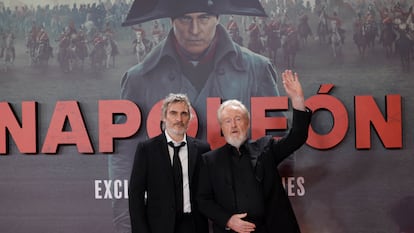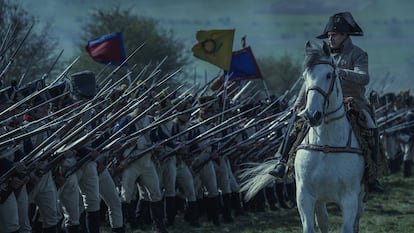Ridley Scott’s ‘Napoleón’ has few fans in France: ‘A very anti-French film’
Historians point out factual errors and hostile bias against the emperor in the movie by the ‘Blade Runner’ director

A Brit telling the story of the French Cesar. A tale that begins with a mistake (Napoleon Bonaparte attending the beheading of Marie Antoinette, which didn’t happen) and ending with an unfurling of the number of the deaths he left in his wake across Europe (subtext: he was a forerunner of Hitler and Stalin). Even worse: the Empereur and the rest of the protagonists speak in English. What could go wrong?
Ridley Scott’s film, which debuts this week, has touched a nerve in France. There aren’t many world leaders whose tombs are located in the center of a nation’s capital: Lenin, Mao… and Napoleon, whose remains rest in the Les Invalides monument. It’s impossible to understand this country without the man who embodied the last real moment of French power in the world, and who laid the groundwork for its modern state.
“I’m a stalwart Ridley Scott fan,” historian Jean Tulard said on Tuesday evening. Apart from being a fan of the director of Blade Runner, Alien and Gladiator, Tulard is also one of Napoleon, or at least, he is one of his most distinguished scholars and a biographer of note. Tulard was speaking at a colloquium organized by the magazine Le Figaro Histoire at L’Arlequin, a Parisian movie theater where the audience had just attended a preview of Napoleon. The historian said, “I am speaking to you as a film buff.”
It was an important distinction. Because, following that statement, Tulard and the other historians participating in the colloquium proceeded to dismantle — elegantly, but relentlessly — the film we had just seen. Some of the assessments heard on the L’Arlequin stage: “It hides the political landscape”; “I was disappointed by the setting”, “during the battle of Austerlitz, you can’t understand a thing”; “it is an incomplete Napoleon”; “at times, monolithic”.
Tulard, who at nearly 90 years of age boasts a bibliography of dozens of books on Napoleon Bonaparte, came clean at the end of the talk when he was asked if the new film was a good entry point for a person who is unfamiliar with Napoleon. His answer: “I admire Ridley Scott, but as a Sorbonne history professor, I would advise against seeing this film.” Applause rang out amid the aisles. “As a film buff, yes,” he summed up. “As a historian, no!”

As with any fictional recreation — from the Puy du Fou theme park to the best historical novel — the criticism of Scott’s Napoleon unfolds on two levels. The first is that of the facts. Here, the French are perhaps more prickly and irritable than other audiences, because the protagonist is one of their own. There is a feeling, even if the expression is not used, of cultural appropriation. We tend to speak of cultural appropriation when a member of a majority uses the symbols or traditions of an oppressed minority. In this case the appropriator would be an Englishman and the appropriated, a Frenchman.
For example, Tulard points out that Napoleon never carried a saber at Waterloo, although he is lenient because “it’s a Gladiator thing, and Ridley Scott is forgiven”. Another historian who specializes in the era and the historical figure, Patrick Gueniffey, has called out more errors in the weekly news magazine Le Point. One is the previously mentioned presence of the future dictator at the beheading of Queen Marie Antoinette, when at the time Bonaparte was at the siege of Toulon, just shy of 500 miles from Paris. The bombing of the Pyramids is another one of the film’s invented scenes.
There is another level to this criticism, that of the image of Napoleon that Ridley Scott transmits. It’s not that France overlooks the ruler’s sins, such as the dictatorship, his reestablishment of slavery or his endless wars. But it rankles that the protagonist appears as “the caricature of an ambitious, Corsican ogre, a lout who sulks and who at the same time is unkind to his wife,” says Gueniffey. “Ridley Scott,” he adds, “does not realize that this is a logical absurdity: how did a character so dumb, so mediocre and ridiculous come to write such a fate?”
The historian and author of the monumental Bonaparte thinks that Scott “takes up the old caricature that was made of Napoleon just after his fall, and that came from the Restoration or from the English enemy around the time of the Congress of Vienna”. “Visibly, he does not love Napoleon”, Gueniffey laments. And here emerges an idea that runs through the reception of the movie in France: “It’s an anti-Napoleon film. Certainly, he does not deserve accolades, but it’s made without nuance or intelligence”. It is a film, he concludes, that is “very anti-French”.
Anti-French? “The ending is”, says Tulard as he leaves the theater. “The tallying of the dead soldiers, which appears without warning, shows that there is a desire to be hostile towards Napoleon”. Another participant in the colloquium, Geoffroy Caillet, editor in chief of Le Figaro Histoire, adds: “Ridley Scott tends to make people believe that the Empire can be reduced to a story of death, but the Empire is something else: the foundation of modern France after the chaos of the Revolution and also the recovery of part of the monarchical heritage, and this entire dimension, unfortunately, disappears”.
The reference to the three million dead, which concludes two hours of battles and love affairs, disgusts him. “We must remember that Napoleon did not commit genocide. We are talking about the dead of the battlefield,” says Caillet. He sums up his thoughts: “It is not an anti-French film, but it does carry a very Anglo-Saxon worldview”. The uncomfortable and polemical ending conjures other British visions of the emperor, such as that of Paul Johnson, author of a short biography that concludes: “No dictator of the tragic 20th century —from Lenin, Stalin and Mao Zedong to pygmy tyrants like Kim II Sung, Castro, Perón, Mengistu, Saddam Hussein, Ceaucescu and Gadaffi— was free from the echoes of the Napoleonic prototype”.
During the screening at L’Arlequin, no one left the room, no one booed. There was no applause either. One spectator sighed when he saw the three million figure. Another commented, “It’s not that it’s an anti-French film, it’s that simply empty.” Critics have not been enthusiastic. In some cases, they’ve been outright hostile, across ideologies. Left-wing daily Liberatión wrote: “Without really adopting a particular point of or approach, Napoleon is a quietly indecent film, very sure of its inanity.” You don’t mess with Napoleon. Or you mess with him with care. At the end of the colloquium in L’Arlequin, various people shouted: “Long live the Emperor!”
Sign up for our weekly newsletter to get more English-language news coverage from EL PAÍS USA Edition
Tu suscripción se está usando en otro dispositivo
¿Quieres añadir otro usuario a tu suscripción?
Si continúas leyendo en este dispositivo, no se podrá leer en el otro.
FlechaTu suscripción se está usando en otro dispositivo y solo puedes acceder a EL PAÍS desde un dispositivo a la vez.
Si quieres compartir tu cuenta, cambia tu suscripción a la modalidad Premium, así podrás añadir otro usuario. Cada uno accederá con su propia cuenta de email, lo que os permitirá personalizar vuestra experiencia en EL PAÍS.
¿Tienes una suscripción de empresa? Accede aquí para contratar más cuentas.
En el caso de no saber quién está usando tu cuenta, te recomendamos cambiar tu contraseña aquí.
Si decides continuar compartiendo tu cuenta, este mensaje se mostrará en tu dispositivo y en el de la otra persona que está usando tu cuenta de forma indefinida, afectando a tu experiencia de lectura. Puedes consultar aquí los términos y condiciones de la suscripción digital.









































